Busting the Myths and Fears of Buying an Electric Car
[ad_1]
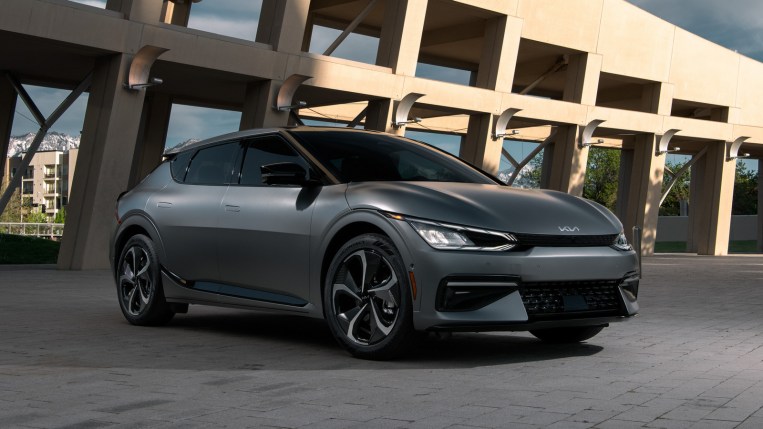
If you don’t like electric cars, there’s nothing wrong with that. But when it comes to electric vehicles, we want to bust the common myths. It turns out that many of the reasons some don’t like electric cars are simply not valid.
Electricity provides one more choice of how to power your vehicle. Today’s options include gas, diesel, hydrogen, gas-electric hybrid, and pure electric. If you’re over 45 years old, all those choices will likely be available for the rest of your driving lifespan. Electric cars arrived in an era of already unprecedented choice. No one is going to force you to buy an electric vehicle.
Even so, if the average American drove an electric car, they might like it. Still, here are a few reasons many have objections to electric vehicles.
Myth: All Electric Cars Feel the Same
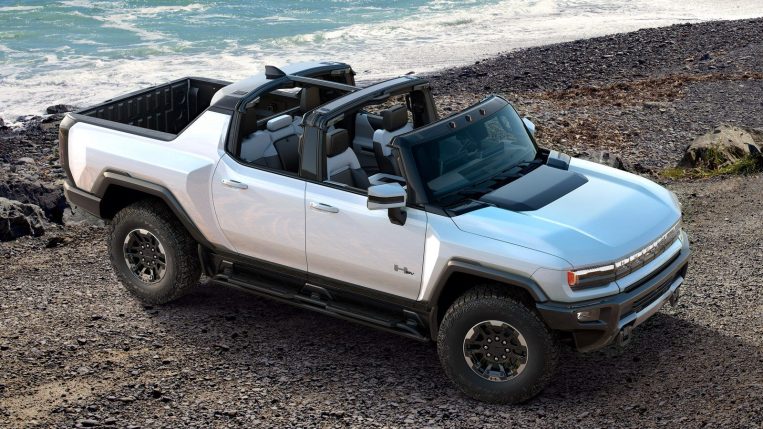
The smooth, effortless feel of electric-powered cars and trucks can feel generic and remove the differentiators between brands and models. It’s possible many electric cars use the same electric motors to do the work of moving the vehicle forward. Several automakers like Chevrolet, Ford, Honda, Toyota, and others have long used the same gasoline engine from their respective brand in multiple models, so this practice isn’t new.
But there are many features automakers can use to give a specific car a distinct experience. A perfect example is the new GMC Hummer EV. It’s fully electric, yet it feels like a genuine Hummer. With the look, the size, the driving dynamics, the features, and the sounds, GMC has gone to great lengths to deliver the unique Hummer experience. Most other electric trucks are nearly silent in comparison.
With almost completely silent operation, EVs present a great canvass for sound design. For the GMC HUMMER EV, we wanted to have an engaging and bold sound that exuberates confidence in capability. The truck’s sonic identity is precise and powerful, a reflection of its size and torque. It is not overly refined in terms of the sounds we deployed but instead features dynamic distortion effects. With guitar riffs and layers of synthetic sounds, HUMMER EV’s purposeful modulation of sound helps create feelings of power and intensity. – Jay Kapadia, creative sound director
Yes, GMC employs a sound director.
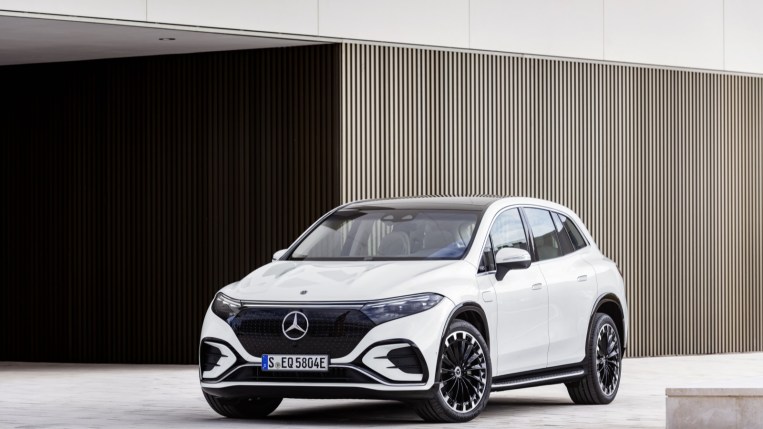
Another example is the new Mercedes EQS sedan and its SUV counterpart. They are fully electric and feel every bit like a Mercedes-Benz. If you think recent versions of the E-Class and C-Class lack that genuine “Benz” character, the EQS sedan and SUV will make you very happy. It’s like the engineers went back in time to when Mercedes vehicles felt big and solid and combined that with the best of today’s ride, handling, technology, and interior textures. Both vehicles are the best Mercedes-Benz vehicle have ever been. The EQS vehicles do not feel like the Nissan Leaf or Tesla Model S, and that’s a guarantee.
The Hummer EV and Mercedes-Benz EQS sedan and SUV are dramatically different, yet capture the character, look, and feel of their respective brands overall.
In fairness, both vehicles cost more than $100,000. So, of course, they must feel special. Isn’t that the case with gasoline-powered cars and how paying more means a better experience? No one really thinks a Nissan Versa offers the same qualities and character as a fully loaded Pathfinder. In that respect, electric cars feel no different than any other consumer product. Remember that line from Forest Gump, “Life is like a box of chocolates …?” It turns out life IS like a box of chocolates because you’ve got to pay more for the good ones. See’s Candies and Whitman’s Sampler offer boxes of chocolates but do not taste similar. Electric cars are no different.
Myth: Performance Cars Need a Rumbling Gas Engine
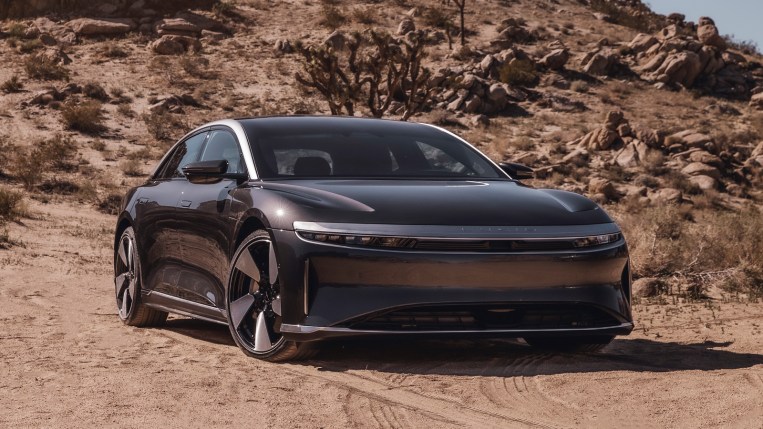
This argument gets to the heart of automobiles in the United States. They’re emotional purchases, which is especially true of high-performance cars. Why are Dodge’s Hellcat cars so popular? Because they make you feel something. For more than a century, automobiles have been a visceral experience — and yet not all visceral experiences are worth keeping. Does anyone miss the feeling of wearing goggles because all the roads were dirt at one point? Or the prospect of hand cranking the car to life with a large handle before electric starters got invented? Probably not.
The thing about electric cars is that, once consumers experience one, they’ll see gasoline-powered cars as crude, noisy, and unrefined. Sure, plenty of buyers like crude and unrefined. We’re among them. However, that population will eventually become a smaller and smaller subset of the larger car-buying audience.
But electric cars can beat or match the stats of gasoline-powered vehicles regardless of the seat-of-the-pants experience. Hybrid and electric vehicles drive quicker or as quickly as their gasoline-powered counterparts. When it comes to high-dollar performance cars, you’ll find the electric and gasoline-powered versions equally matched. Check out the stats below.
Electric Performance Cars
- 2022 Tesla Model S Plaid: 0-60 mph in about 2 seconds
- 2022 Lucid Air Dream Performance: 0-60 mph in about 2.5 seconds
- 2022 Tesla Model X Plaid: 0-60 mph in 2.5 seconds
- 2022 Porsche Taycan Turbo S: 0-60 mph in 2.6 seconds
Gasoline Performance Cars
- Ferrari SF90 Stradale Assetto Fiorano: 0-60 mph in 2.1 seconds
- Porsche 911 Turbo S: 0-60 mph in 2.6 seconds
- Porsche 911 Turbo: 0-60 mph in 2.7 seconds
And these are just a few examples on each side. But what about cars that don’t cost six figures? Electric cars can indeed cost more money than gas-powered vehicles. At this point, electric cars are luxury cars. Sure, there’s the Nissan Leaf and Chevy Bolt, but most others cost more than $40,000.
But even the mid-priced EVs offer horsepower. Kia’s new EV6 (starts at $40,900) sprints from 0-60 in as little as 4.6 seconds, while the gas-powered Kia Stinger GT gets there in 4.7 seconds. It’s a similar story with Hyundai’s Ioniq 5 and the Veloster N, although the Veloster is much less expensive than the 320-horsepower version of the Ioniq 5. The brisk acceleration of an electric car is most noticeable compared to gasoline-powered cars in the under $60,000 range.
Myth: All Electric Cars Look Ugly
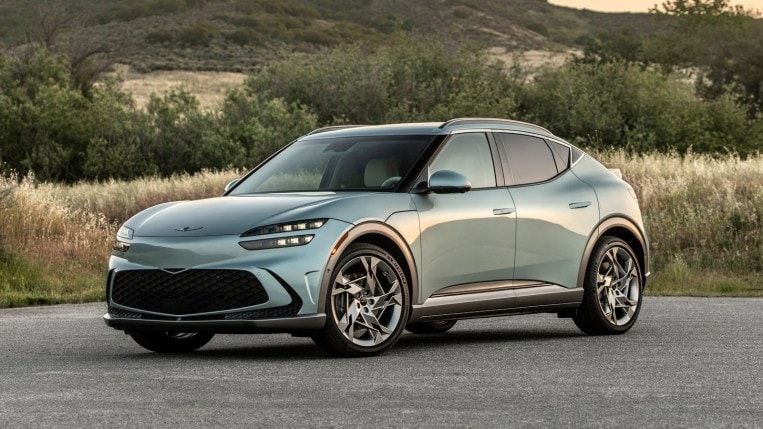
At one point, this was true. Electric cars looked like a college project with professional paint, but not today. The best argument against this is the 2023 Genesis GV60. It’s a beautiful automobile regardless of how it’s powered. Tesla has also taught us that what we want from an electric vehicle is a stylish, luxurious, and quick car with a long driving range.
While Tesla kicked off that trend, other automakers are more than happy to keep it going. Electric cars and trucks like the Audi e-tron GT, Hyundai Ioniq 5, Kia EV6, Rivian R1T, Porsche Taycan, VW ID.4, and many others look sleek. They’re also fun to drive. While cars like the Audi and Porsche typically cost more than $100,000, the Hyundai Ioniq 5, Kia EV6, and Volkswagen ID.4 are in the $40,000 to $50,000 range, about the same as a gas-powered midsize SUV with plenty of options.
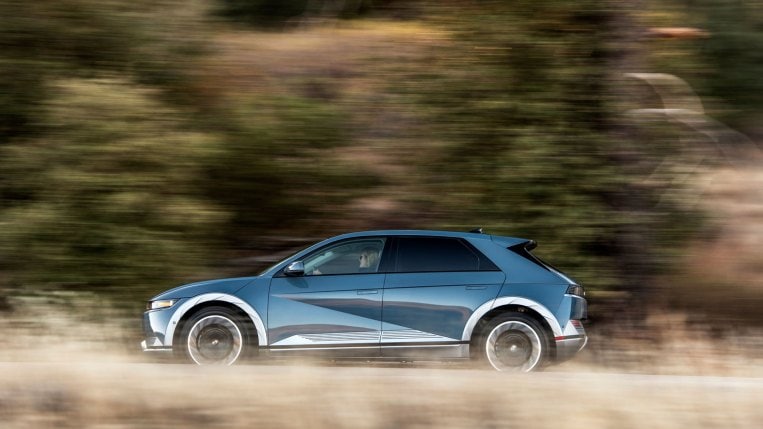
The Hyundai Ioniq 5 looks especially attractive and pulls off a modern yet retro look. It’s anything but ugly regardless of how it’s powered. The Honda e also looks sharp. It’s not available to American buyers, but it shows what’s possible.
Among the reasons for this: Designers of the new crop of electric cars envision the vehicles separately from gas-powered vehicles. They’re more than gasoline-powered cars converted to run on battery power. For example, Kia developed its EV6 as an electric car from the start. When designers don’t need to draw and engineer around a large gas tank and huge metal engine up front, it frees them up to make different and even more dramatic choices.
Kia Motors America’s James Hope says it like this:
“Building off a dedicated EV platform has many advantages, and you’re seeing that with the recent launch of the all-new Kia EV6. The platform allows for better interior packaging, which results in a roomier cabin with a flat floor for greater comfort. This dedicated platform approach allowed Kia’s designers to extend the wheelbase and significantly decrease the front and rear overhangs, allowing for more freedom in the exterior design process. Weight distribution is lower thanks to the underfloor battery pack and is also improved because components can be better located and don’t necessarily need to be placed around a large gasoline engine. Ultimately, there are far less compromises designers and engineers have to make when working with a dedicated EV platform.”
Myth: Electric Cars Cost Too Much

The Nissan Leaf and Chevrolet Bolt cost less than you might expect. The Leaf starts at $27,400, making it, along with the Chevy Bolt (priced at $31,500 on up), among the most affordable all-electric cars you can get. While it’s true that most electric vehicles can be pricey, we already see some easing in EV prices. VW’s new and attractive ID.4 is a nicely equipped crossover that starts at $41,230.
By comparison, you can find a Telsa’s Model Y commands just over $60,000 and the all-electric Volvo XC40 costs just below $50,000. There will undoubtedly be more high-end, luxury branded EVs, but more and more affordable electric cars will also be available within the next few years.
The government also offers federal tax credits of up to $7,500 that help some buyers lower the cost of an electric vehicle. In addition, you can find state and local rebates, plus electricity discounts on expenses associated with your EV.
Myth: There’s No Place to Charge Electric Cars
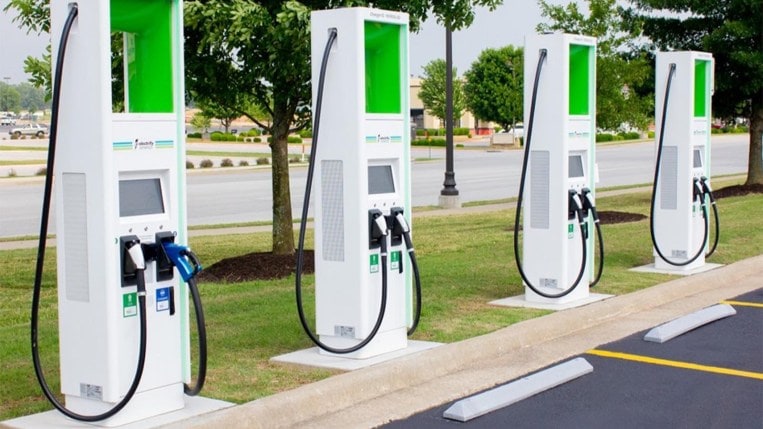
This is somewhat true. However, recent research by Kelley Blue Book parent Cox Automotive found that 80% of electric cars get charged at home. The Natural Resources Defense Fund (NRDC) confirms this and adds that many electric car owners charge up at their workplace.
Still, drivers need more charging stations. According to the website Statista, the U.S. had almost 113,600 charging outlets for plug-in electric vehicles (EVs) as of January 2022. By comparison, the American Petroleum Institute says more than 145,000 gas stations are across the U.S. This seems close, but consider how it takes significantly more time to charge up an electric car than the time it takes to refuel a gasoline-powered car. Much more electric vehicle charging stations are needed. Here’s what Matt Degen, a Kelley Blue Book editor, says about it:
“While Americans are used to seeing gas stations at virtually every corner, that isn’t the case with EV charging stations — at least not yet. But as more electric vehicles hit the road, so will the proliferation of charging stations. The effort is being backed by both the automotive industry and the government. Many automakers are including complimentary charging plans with the sale of new EVs, which will further incentivize the growth of charging stations. Moreover, the White House has earmarked $5 billion over five years to grow the U.S. network of chargers to 500,000, some five times that of today.”
No matter how you feel about tax dollars subsidizing the purchase of $40,000 to $70,000 cars, that 500,000 number is about right. Add to this the fact that electric vehicle charging stations can be unreliable, and suddenly half a million doesn’t seem excessive. The San Francisco Chronicle recently reported that 72.5% of chargers in the Bay Area were working. So it may be true that today, there aren’t enough charging stations to fulfill coming demand, but that will change in the years to come.
Myth: Electric Cars Are Unreliable
If you hear scary stories about unreliable electric cars, we can bust that myth and stop it in its tracks. We drive lots of miles in electric cars to know a few things about how they behave long term. The Nissan Leaf debuted in the U.S. in 2010. That equals more than a decade of experience and millions of miles as an example of how reliable electric cars can be. Generally speaking, electronics can be more demanding than mechanical things.
An electric car is both of those things in one. A gasoline-powered car is also a combination of electronics and mechanical pieces. Unless you’re driving a 1970 Ford LTD, your car simply won’t run without the benefits of computers and electronics.
You may be wrong if you think your gasoline-powered car is more mechanical than electronic. It’s electronics that make that mechanical thing work. An electric vehicle is the same. Also, today’s electric cars come with long warranties on the battery and electric drive components. This applies to hybrid cars as well. About their electric cars, Nissan says this:
“Since we sold the first Nissan LEAF in late 2010, owners have been seeing the financial benefits of trading gas for electricity and significantly less routine maintenance and more reliability offered by an EV.” – Aditya Jairaj, director, EV sales and marketing, Nissan U.S.
Nissan confirms that their Leaf electric car works more reliably than a similar gasoline-powered car. Also, J.D. Power named the Nissan Leaf the Most Dependable in the compact vehicle segment in 2020. There’s evidence that electric vehicles drive just as reliably as gasoline-powered cars.
Warranties on EVs
Still not convinced? Hybrids and electric cars typically offer more extensive warranties on the battery and drive components than would commonly be found with a gasoline-only vehicle. For example, Toyota covers hybrid batteries in its vehicles for 10 years or 150,000 miles, whichever comes first, and 8 years or 100,000 miles for their all-electric cars for the battery and drive components. The warranty for the Nissan Leaf is almost as compelling. According to Nissan, here’s what a new vehicle limited warranty covers:
“Protection for your new Nissan Leaf includes 36-month/36,000-mile (whichever occurs first) basic coverage; 60-month/60,000-mile (whichever occurs first) powertrain and electric vehicle system coverage; and 96-month/100,000-mile (whichever occurs first) Lithium-Ion Battery coverage.”
If you’re buying a 10-year-old electric car with more than 100,000 miles on it and are worried about replacing expensive parts and pieces, that’s a valid concern. However, if you’re buying an electric car that’s 3 to 5 years old with average or below average mileage, your car will likely run just fine.
The bottom line here is that electric cars are different than gasoline-powered cars. Like all kinds of consumer goods and electronics, the farther you go from the proven mainstream brands, the more of a risk you’re taking with long-term performance and reliability.
Electric cars provoke a lot of questions. No one can answer all those questions today. But electric cars will only grow in number, and most EVs are pretty good. If the average American were to drive an electric vehicle, they’d enjoy it. At the very least, an electric car is worth a test drive.
Finally, if you’re interested in an electric car but don’t know where to start, check out our list of the best ones for 2022.
Read Related Electric Vehicle Stories:
[ad_2]
Source link
